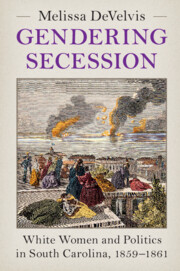Refine search
Actions for selected content:
93 results
1 - “A Unanimity Never before Witnessed”
-
- Book:
- Carolinian Crucible
- Published online:
- 18 November 2025
- Print publication:
- 13 November 2025, pp 16-40
-
- Chapter
- Export citation
Biafra Since 1999: Common Cause Versus a Divided Interest in the Struggle for the Creation of Nationhood
-
- Journal:
- Nationalities Papers , FirstView
- Published online by Cambridge University Press:
- 16 October 2025, pp. 1-19
-
- Article
-
- You have access
- Open access
- HTML
- Export citation
Chapter 5 - International legal personality
-
- Book:
- International Law
- Published online:
- 26 July 2025
- Print publication:
- 31 July 2025, pp 245-302
-
- Chapter
- Export citation
The Right to External Self-Determination of the South-East People of Nigeria: A View from International Law
-
- Journal:
- Journal of African Law / Volume 69 / Issue 3 / October 2025
- Published online by Cambridge University Press:
- 25 June 2025, pp. 441-457
- Print publication:
- October 2025
-
- Article
-
- You have access
- Open access
- HTML
- Export citation
Chapter 3 - Ideology and the Authoritarian Tendency of Revolutions
-
- Book:
- Ideology and Revolution
- Published online:
- 13 March 2025
- Print publication:
- 20 March 2025, pp 142-174
-
- Chapter
- Export citation
2 - “The Gay Season,” January–May 1860
-
- Book:
- Gendering Secession
- Published online:
- 06 March 2025
- Print publication:
- 13 March 2025, pp 74-92
-
- Chapter
- Export citation
5 - The Waiting Game, December 1860–March 1861
-
- Book:
- Gendering Secession
- Published online:
- 06 March 2025
- Print publication:
- 13 March 2025, pp 161-185
-
- Chapter
- Export citation
4 - South Carolina Takes Action, October–December 1860
-
- Book:
- Gendering Secession
- Published online:
- 06 March 2025
- Print publication:
- 13 March 2025, pp 126-160
-
- Chapter
- Export citation
6 - Catharsis and Conclusion
-
- Book:
- Gendering Secession
- Published online:
- 06 March 2025
- Print publication:
- 13 March 2025, pp 186-203
-
- Chapter
- Export citation
3 - Escaping the Sickly Season, May–September 1860
-
- Book:
- Gendering Secession
- Published online:
- 06 March 2025
- Print publication:
- 13 March 2025, pp 93-125
-
- Chapter
- Export citation

Gendering Secession
- White Women and Politics in South Carolina, 1859–1861
-
- Published online:
- 06 March 2025
- Print publication:
- 13 March 2025
1 - Nation
-
- Book:
- Ethnos of the Earth
- Published online:
- 12 December 2024
- Print publication:
- 19 December 2024, pp 29-78
-
- Chapter
- Export citation
3 - The “Genius of American Politics”
- from Part II - Understanding the South and the American Identity
-
- Book:
- Understanding the American South
- Published online:
- 05 December 2024
- Print publication:
- 12 December 2024, pp 66-88
-
- Chapter
- Export citation
Self-Determination and the Value of Nationality
-
- Journal:
- Canadian Journal of Philosophy / Volume 53 / Issue 4 / May 2023
- Published online by Cambridge University Press:
- 17 May 2024, pp. 315-335
-
- Article
-
- You have access
- Open access
- HTML
- Export citation
4 - The Spectre of Katanga
- from Part II - International Advocacy
-
- Book:
- States-in-Waiting
- Published online:
- 09 May 2024
- Print publication:
- 16 May 2024, pp 116-142
-
- Chapter
-
- You have access
- Open access
- HTML
- Export citation
4 - Five Procedural Principles
- from Part I - Political Community
-
- Book:
- Statehood as Political Community
- Published online:
- 15 February 2024
- Print publication:
- 22 February 2024, pp 102-138
-
- Chapter
- Export citation
3 - The Antecedents of Statehood
- from Part I - Political Community
-
- Book:
- Statehood as Political Community
- Published online:
- 15 February 2024
- Print publication:
- 22 February 2024, pp 70-101
-
- Chapter
- Export citation
Introduction
-
- Book:
- Statehood as Political Community
- Published online:
- 15 February 2024
- Print publication:
- 22 February 2024, pp 1-16
-
- Chapter
- Export citation
5 - The Stability Thesis
- from Part II - Stability, Legitimacy, and Democracy
-
- Book:
- Statehood as Political Community
- Published online:
- 15 February 2024
- Print publication:
- 22 February 2024, pp 141-168
-
- Chapter
- Export citation
10 - Group Rights: Self-determination, Minorities and Indigenous Peoples
-
- Book:
- International Human Rights Law and Practice
- Published online:
- 08 February 2024
- Print publication:
- 15 February 2024, pp 476-522
-
- Chapter
- Export citation
